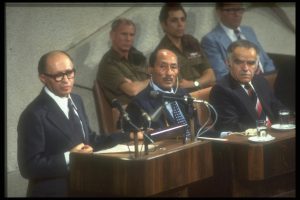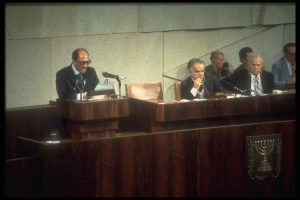November, 2017
201714Nov13:3040 Years since the Historic Visit of Egyptian President Anwar Sadat to Israel13:30
Event Details
A lecture by Ofir Winter, PhD When: Tuesday, November 14, 13:30 Where: John S. Bailey Library, Upper Level Organized by: Institute of Diplomacy & Global Affairs – Office of Public Affairs, Office of Student Affairs, International Honors Society,
Event Details
A lecture by
Ofir Winter, PhD
When: Tuesday, November 14, 13:30
Where: John S. Bailey Library, Upper Level
Organized by: Institute of Diplomacy & Global Affairs – Office of Public Affairs, Office of Student Affairs, International Honors Society, History Department, and the History Society
Register at [email protected] or at [email protected]
For more information, please contact: 210 600 9800 ext. 1107
Bio
Dr. Ofir Winter is a research fellow at Institute for National Security Studies (INSS). He holds a PhD from the Department of Middle Eastern and African History at Tel Aviv University and his doctoral research focused on Egypt and Jordan’s quest to legitimize their peace treaties with Israel between the years 1973-2001. He is the author of the book Zionism in Arab Discourses (Manchester University Press, 2016, with Uriya Shavit), and the author of several articles on the politics of Egypt, the Arab-Israeli conflict, church and state in the Arab world, and contemporary Muslim law. He also teaches Islamic fundamentalism and economics in the Arab world at Shalem College.
Exhibition
In November 19, 1977, Egyptian President Anwar Sadat’s plane landed at Israel’s Ben-Gurion airport at the start of his historic 36-hour visit to Israel. When the airplane door opened and the silhouette of Sadat appeared, everyone felt that peace was coming. Israel’s Prime Minister Menachem Begin, and Israeli President Ephraim Katzir, were there to welcome him, and a 21-gun salute was fired in his honor.
Ten days earlier, on 9 November 1977, after attempts at a joint Soviet-American sponsored peace conference had fallen apart, Sadat, in a speech to the Egyptian Parliament, offered to go to the Knesset to discuss peace. Prime Minister Begin, extended the invitation to Sadat via the United States on 15 November in a letter which stated, “Your Excellency’s readiness to undertake such a visit, as expressed to the People’s Council of Egypt, has been noted here with deep and positive interest, as has your statement that you wish to address the members of our Parliament, the Knesset, and to meet with me.” Sadat quickly accepted the invitation and Israel’s repeated calls for peace were finally answered.
The climax of the visit was the speech delivered by President Sadat on 20 November, in the Knesset plenum, in which he called for the establishment of peaceful relations between the two countries. “There is no one who imagined that the president of the largest Arab state, with the primary responsibility for war and peace in the Middle East, could declare his decision to be willing to go to the enemy’s land,” stated Sadat, also stressing that “peace is not the signing of written lines, but a new writing of history.” He concluded his speech by addressing the people of Israel: “I am carrying to you, on behalf of the Egyptian people, a mission of peace.” In his reply, Prime Minister Begin expressed his appreciation to Sadat for his courage and spoke of Israel’s desire for peace with all its neighbors. This visit marked the beginning of the negotiations. In 1979, the peace treaty was signed and relations between the two countries were established.
President Sadat realized that the key to peace is found in mutual recognition and direct dialogue with Israel. He came to speak to the Israeli people and to negotiate with their leaders without preconditions. The result was an end to 30 years of wars and the beginning of 40 years of peace between Israel and Egypt ever since. After signing the agreement, the Egyptian president visited Israel two more times, in May 1979, in Be’er Sheva, and in September 1979 in Haifa.
Israelis reacted warmly to this historical visit. When the visit was announced on Israeli radio, residents in Jerusalem took to the streets in celebration and were literally dancing in the streets. One woman remarked to the Jerusalem Post, “I saw on TV the landing of the moon – it was nothing compared to this.”


